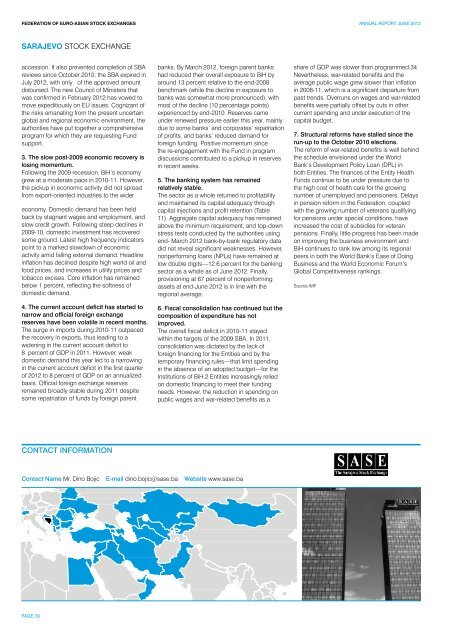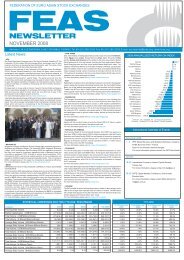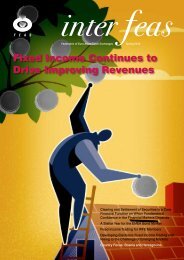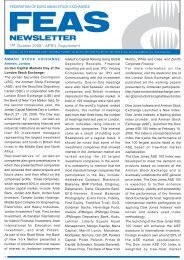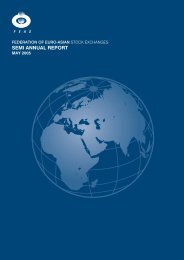JUNE 2013 - FEAS
JUNE 2013 - FEAS
JUNE 2013 - FEAS
- No tags were found...
Create successful ePaper yourself
Turn your PDF publications into a flip-book with our unique Google optimized e-Paper software.
FEDERATION OF EURO-ASIAN STOCK EXCHANGES ANNUAL REPORT <strong>JUNE</strong> <strong>2013</strong>SARAJEVO STOCK EXCHANGEaccession. It also prevented completion of SBAreviews since October 2010; the SBA expired inJuly 2012, with only ⅓ of the approved amountdisbursed. The new Council of Ministers thatwas confirmed in February 2012 has vowed tomove expeditiously on EU issues. Cognizant ofthe risks emanating from the present uncertainglobal and regional economic environment, theauthorities have put together a comprehensiveprogram for which they are requesting Fundsupport.3. The slow post-2009 economic recovery islosing momentum.Following the 2009 recession, BiH’s economygrew at a moderate pace in 2010-11. However,the pickup in economic activity did not spreadfrom export-oriented industries to the widereconomy. Domestic demand has been heldback by stagnant wages and employment, andslow credit growth. Following steep declines in2009-10, domestic investment has recoveredsome ground. Latest high frequency indicatorspoint to a marked slowdown of economicactivity amid falling external demand. Headlineinflation has declined despite high world oil andfood prices, and increases in utility prices andtobacco excises. Core inflation has remainedbelow 1 percent, reflecting the softness ofdomestic demand.4. The current account deficit has started tonarrow and official foreign exchangereserves have been volatile in recent months.The surge in imports during 2010-11 outpacedthe recovery in exports, thus leading to awidening in the current account deficit to8¾ percent of GDP in 2011. However, weakdomestic demand this year led to a narrowingin the current account deficit in the first quarterof 2012 to 8 percent of GDP on an annualizedbasis. Official foreign exchange reservesremained broadly stable during 2011 despitesome repatriation of funds by foreign parentbanks. By March 2012, foreign parent bankshad reduced their overall exposure to BiH byaround 13 percent relative to the end-2008benchmark (while the decline in exposure tobanks was somewhat more pronounced), withmost of the decline (10 percentage points)experienced by end-2010. Reserves cameunder renewed pressure earlier this year, mainlydue to some banks’ and corporates’ repatriationof profits, and banks’ reduced demand forforeign funding. Positive momentum sincethe re-engagement with the Fund in programdiscussions contributed to a pickup in reservesin recent weeks.5. The banking system has remainedrelatively stable.The sector as a whole returned to profitabilityand maintained its capital adequacy throughcapital injections and profit retention (Table11). Aggregate capital adequacy has remainedabove the minimum requirement, and top-downstress tests conducted by the authorities usingend- March 2012 bank-by-bank regulatory datadid not reveal significant weaknesses. However,nonperforming loans (NPLs) have remained atlow double digits—12.6 percent for the bankingsector as a whole as of June 2012. Finally,provisioning at 67 percent of nonperformingassets at end-June 2012 is in line with theregional average.6. Fiscal consolidation has continued but thecomposition of expenditure has notimproved.The overall fiscal deficit in 2010-11 stayedwithin the targets of the 2009 SBA. In 2011,consolidation was dictated by the lack offoreign financing for the Entities and by thetemporary financing rules—that limit spendingin the absence of an adopted budget—for theInstitutions of BiH.2 Entities increasingly reliedon domestic financing to meet their fundingneeds. However, the reduction in spending onpublic wages and war-related benefits as ashare of GDP was slower than programmed.34Nevertheless, war-related benefits and theaverage public wage grew slower than inflationin 2008-11, which is a significant departure frompast trends. Overruns on wages and war-relatedbenefits were partially offset by cuts in othercurrent spending and under execution of thecapital budget.7. Structural reforms have stalled since therun-up to the October 2010 elections.The reform of war-related benefits is well behindthe schedule envisioned under the WorldBank’s Development Policy Loan (DPL) inboth Entities. The finances of the Entity HealthFunds continue to be under pressure due tothe high cost of health care for the growingnumber of unemployed and pensioners. Delaysin pension reform in the Federation, coupledwith the growing number of veterans qualifyingfor pensions under special conditions, haveincreased the cost of subsidies for veteranpensions. Finally, little progress has been madeon improving the business environment andBiH continues to rank low among its regionalpeers in both the World Bank’s Ease of DoingBusiness and the World Economic Forum’sGlobal Competitiveness rankings.Source IMFCONTACT INFORMATIONContact Name Mr. Dino Bojic E-mail dino.bojic@sase.ba Website www.sase.baPAGE 78


